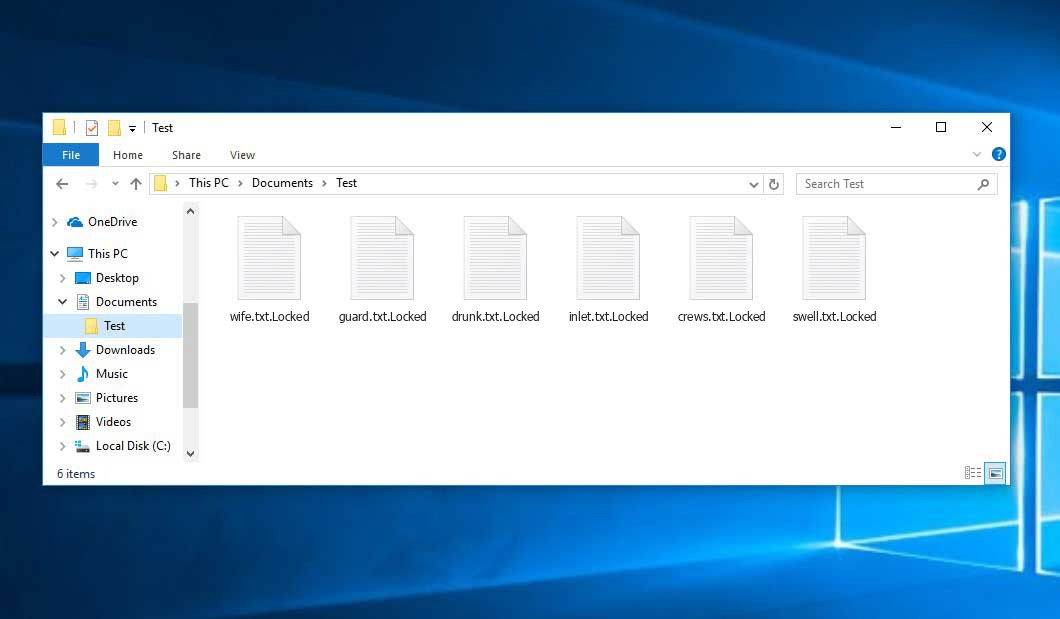The Blocky virus belongs to the ransomware type of infection. A harmful program of this type encrypts all the data on your computer (images, text files, excel sheets, audio files, videos, etc) and adds its own extension to every file, leaving the READ_IT.txt files in every folder which contains the encrypted files.
Blocky virus: what is known so far?
☝️ A scientifically correct denomination for the Blocky is “a ransomware-type infection”.
Blocky appends its specific .Locked extension to the title of every encoded file. For instance, a file named “photo.jpg” will be altered to “photo.jpg.Locked”. Likewise, the Excel file named “table.xlsx” will be changed to “table.xlsx.Locked”, and so on.
In each folder that contains the encoded files, a READ_IT.txt file will be found. It is a ransom money note. It contains information about the ways of paying the ransom and some other information. The ransom note most probably contains instructions on how to buy the decryption tool from the tamperers. That is pretty much the scheme of the crime.
Blocky abstract:
| Name | Blocky Virus |
| Extension | .Locked |
| Ransomware note | READ_IT.txt |
| Detection | Crytex.Virus.FileInfector.DDS, Win32/Filecoder.OLC, Malware-Cryptor.InstallCore.5 |
| Symptoms | Your files (photos, videos, documents) get a .Locked extension and you can’t open them. |
| Fix Tool | See If Your System Has Been Affected by Blocky virus |
In the image below, you can see what a directory with files encrypted by the Blocky looks like. Each filename has the “.Locked” extension added to it.
How did Blocky ransomware end up on my PC?
There are many possible ways of ransomware injection.
Nowadays, there are three most exploited ways for criminals to have the Blocky virus settled in your system. These are email spam, Trojan infiltration and peer networks.
If you access your inbox and see emails that look like familiar notifications from utility services companies, postal agencies like FedEx, web-access providers, and whatnot, but whose “from” field is unknown to you, beware of opening those emails. They are most likely to have a malware item attached to them. Thus it is even more dangerous to download any attachments that come with letters like these.
Another option for ransom hunters is a Trojan horse scheme1. A Trojan is a program that infiltrates into your PC pretending to be something legal. Imagine, you download an installer of some program you need or an update for some software. But what is unboxed reveals itself a harmful agent that compromises your data. As the update package can have any name and any icon, you have to make sure that you can trust the resource of the stuff you’re downloading. The optimal way is to use the software developers’ official websites.
As for the peer-to-peer file transfer protocols like torrent trackers or eMule, the danger is that they are even more trust-based than the rest of the Internet. You can never guess what you download until you get it. So you’d better be using trustworthy websites. Also, it is a good idea to scan the directory containing the downloaded objects with the anti-malware utility as soon as the downloading is finished.
How to remove the Blocky virus?
It is important to note that besides encrypting your files, the Blocky virus will most likely install the Azorult Spyware on your PC to get access to credentials to various accounts (including cryptocurrency wallets). The mentioned spyware2 can extract your logins and passwords from your browser’s auto-filling cardfile.
Sometimes tamperers would unblock some of your files to prove that they do have the decryption tool. As Blocky virus is a relatively recent ransomware, anti-malware designers have not yet found a method to reverse its work. However, the decryption instruments are frequently updated, so the solution may soon arrive.
Understandably, if the tamperers do the job of encoding someone’s critical data, the hopeless person will most likely comply with their demands. Nevertheless, paying a ransom does not necessarily mean that you’re getting your files back. It is still risky. After obtaining the money, the racketeers may deliver a wrong decryption key to the victim. There were reports of criminals just vanishing after getting the ransom without even bothering to reply.
The optimal safety measure against ransomware is to have aan OS restore point or the copies of your critical files in the cloud disk or at least on an external storage. Surely, that might be not enough. The most crucial thing could be that one you were working on when it all happened. Nevertheless, it is something. It is also reasonable to scan your drives with the antivirus program after the system restoration.
There are other ransomware products, besides Blocky, that work similarly. For instance, Mppn, Uyit, Mbtf, and some others. The two main differences between them and the Blocky are the ransom amount and the encoding method. The rest is the same: documents become inaccessible, their extensions changed, ransom notes appear in every directory containing encrypted files.
Some fortunate people were able to decode the arrested files with the aid of the free software provided by anti-ransomware developers. Sometimes the racketeers mistakenly send the decryption key to the wronged in the ransom note. Such an epic fail allows the user to restore the files. But obviously, one should never expect such a chance. Make no mistake, ransomware is a bandits’ instrument to lay their hands on the money of their victims.
How сan I avoid ransomware attack?
Blocky ransomware doesn’t have a endless power, neither does any similar malware.
You can protect your PC from its infiltration in three easy steps:
- Ignore any letters from unknown mailboxes with unknown addresses, or with content that has likely no connection to something you are expecting (can you win in a money prize draw without participating in it?). If the email subject is more or less something you are waiting for, scrutinize all elements of the dubious email carefully. A fake letter will always have mistakes.
- Avoid using cracked or unknown programs. Trojans are often spreaded as an element of cracked products, possibly as a “patch” preventing the license check. Understandably, potentially dangerous programs are very hard to tell from reliable software, because trojans sometimes have the functionality you need. Try to find information about this software product on the anti-malware forums, but the best way is not to use such programs at all.
- And finally, to be sure about the safety of the objects you downloaded, scan them with GridinSoft Anti-Malware. This software will be a powerful defense for your system.
Reasons why I would recommend GridinSoft3
There is no better way to recognize, remove and prevent ransomware than to use an anti-malware software from GridinSoft4.
Download Removal Tool.
You can download GridinSoft Anti-Malware by clicking the button below:
Run the setup file.
When setup file has finished downloading, double-click on the setup-antimalware-fix.exe file to install GridinSoft Anti-Malware on your system.
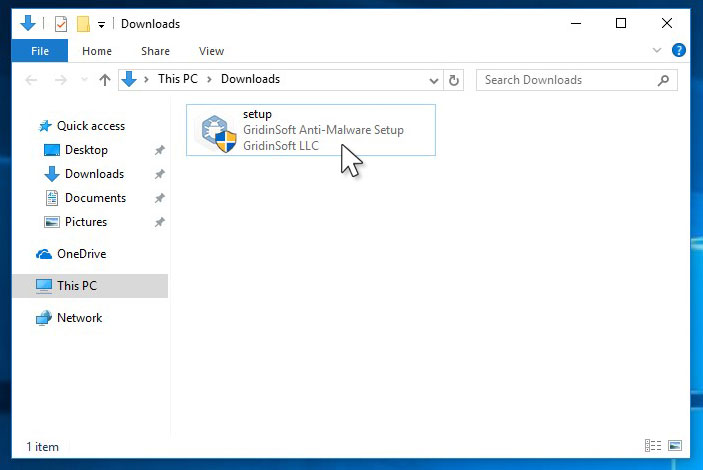
An User Account Control asking you about to allow GridinSoft Anti-Malware to make changes to your device. So, you should click “Yes” to continue with the installation.
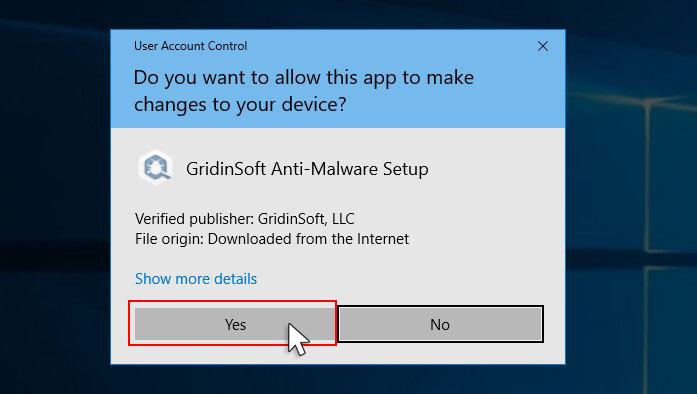
Press “Install” button.
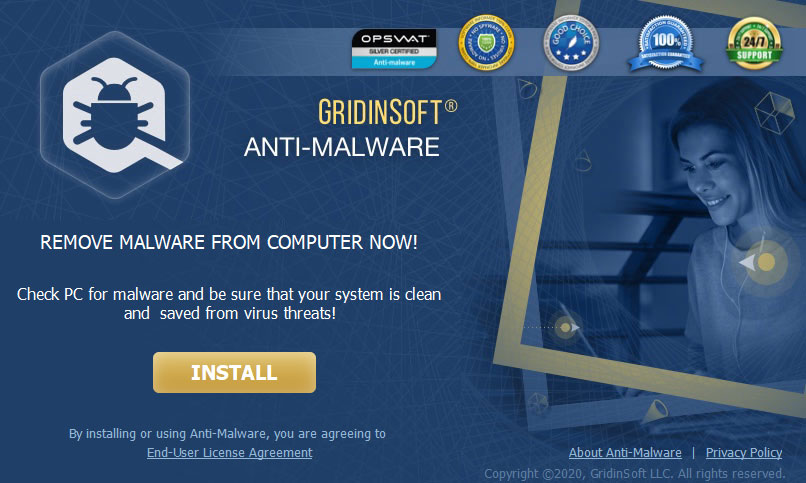
Once installed, Anti-Malware will automatically run.
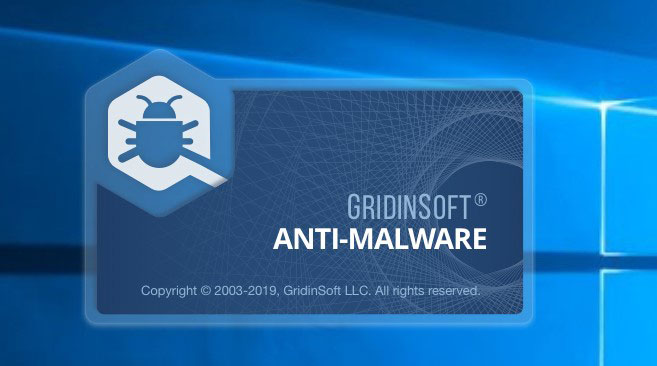
Wait for the Anti-Malware scan to complete.
GridinSoft Anti-Malware will automatically start scanning your system for Blocky infections and other malicious programs. This process can take a 20-30 minutes, so I suggest you periodically check on the status of the scan process.
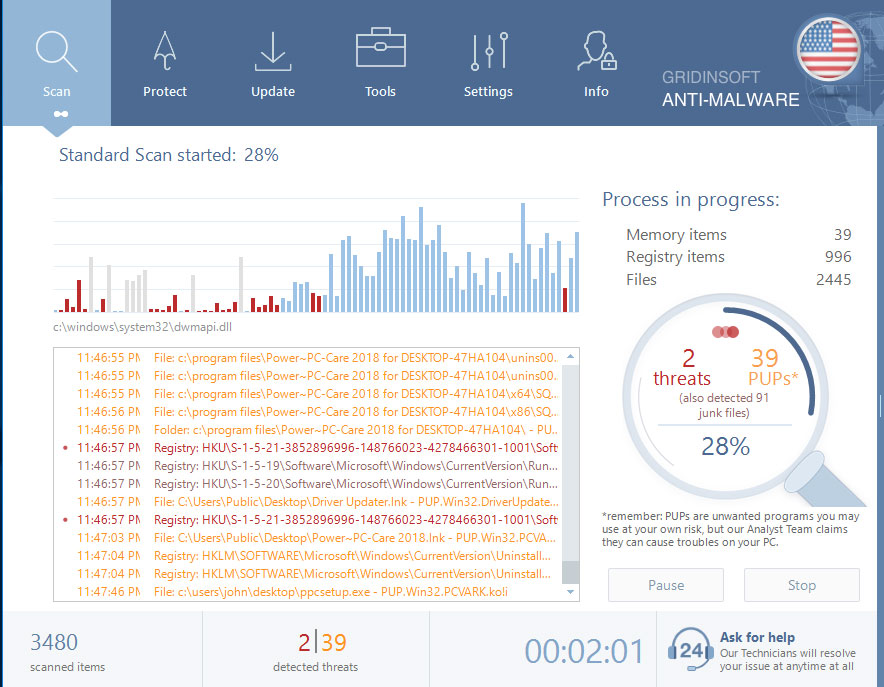
Click on “Clean Now”.
When the scan has completed, you will see the list of infections that GridinSoft Anti-Malware has detected. To remove them click on the “Clean Now” button in right corner.
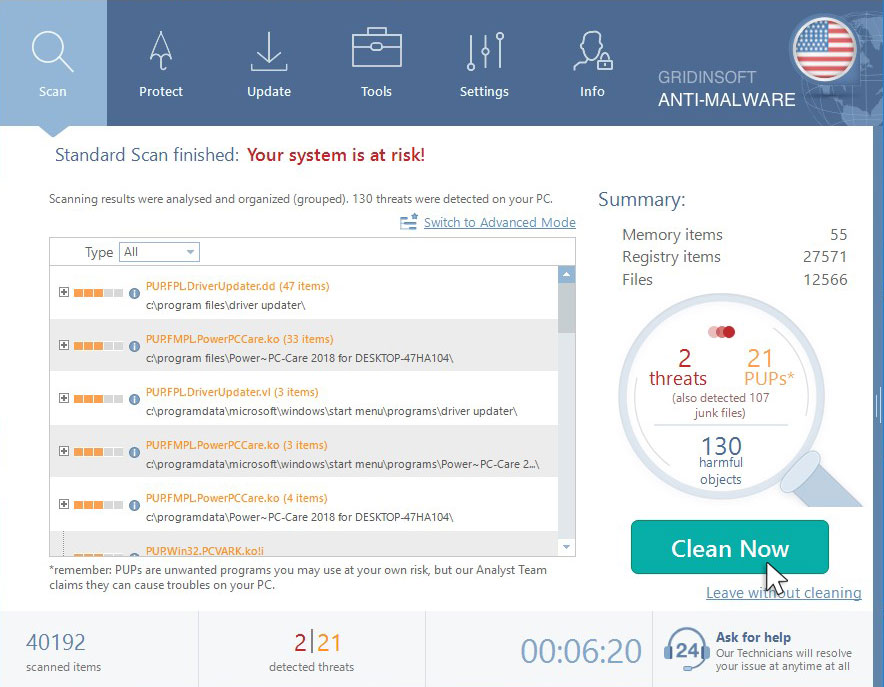
Frequently Asked Questions
🤔 How can I open “.Locked” files?Are the “.Locked” files accessible?
There’s no way to do it, unless the files “.Locked” files are decrypted.
🤔 The encrypted files are very important to me. How can I decrypt them quickly?
If the “.Locked” files contain some really important information, then you probably have them backed up. Otherwise, you might try to employ System Restore. The only question is whether you have saved any Restore Points that would be helpful now. All other solutions require time.
🤔 Will GridinSoft Anti-Malware remove all the encrypted files alongside the Blocky virus?
Of course not. The encrypted files are not harmful, so they won’t be deleted.
With the help of GridinSoft Anti-Malware, you can clean your PC off the actual viruses. The ransomware that has infected your system is probably still functional and launching checks every so often to encode any new files you might create on your PC after the infection. As it has already been said, the Blocky malware does not come alone. It installs backdoors and keyloggers that can take your account passwords by trespass and provide criminals with easy access to your system in the future.
🤔 What to do if the Blocky malware has blocked my PC and I can’t get the activation code.
In such a case, you need to have a flash memory card with a pre-installed Trojan Killer. Use Safe Mode to perform the procedure. You see, the ransomware starts automatically as the system launches and encrypts any new files created or imported into your PC. To block this process – use Safe Mode, which allows only the vital programs to run automatically. Consider reading our manual on running Windows in Safe Mode.
🤔 And what should I do now?
Some of the blocked data can be located elsewhere.
- If you exchanged your important files by email, you could still download them from your online mailbox.
- You might have shared images or videos with your friends or relatives. Simply ask them to post those images back to you.
- If you have initially downloaded any of your files from the Internet, you can try doing it again.
- Your messengers, social networks pages, and cloud drives might have all those files too.
- Maybe you still have the needed files on your old computer, a notebook, phone, external storage, etc.
HINT: You can use file recovery programs5 to get your lost data back since ransomware blocks the copies of your files, removing the authentic ones. In the tutorial below, you can see how to recover your files with PhotoRec, but be advised: you won’t be able to do it before you eradicate the virus with an antivirus program.
Also, you can contact the following official fraud and scam sites to report this attack:
- In the United States: On Guard Online;
- In Canada: Canadian Anti-Fraud Centre;
- In the United Kingdom: Action Fraud;
- In Australia: SCAMwatch;
- In New Zealand: Consumer Affairs Scams;
- In France: Agence nationale de la sécurité des systèmes d’information;
- In Germany: Bundesamt für Sicherheit in der Informationstechnik;
- In Ireland: An Garda Síochána;
To report the attack, you can contact local executive boards. For instance, if you live in USA, you can have a talk with FBI Local field office, IC3 or Secret Service.
I need your help to share this article.
It is your turn to help other people. I have written this guide to help users like you. You can use the buttons below to share this on your favorite social media Facebook, Twitter, or Reddit.
Brendan SmithHow to Remove BLOCKY Ransomware & Recover PC
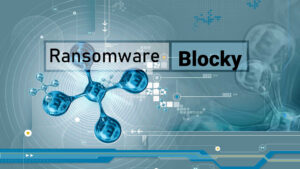
Name: BLOCKY Virus
Description: BLOCKY Virus is a ransomware-type infections. This virus encrypts important personal files (video, photos, documents). The encrypted files can be tracked by a specific .Locked extension. So, you can't use them at all.
Operating System: Windows
Application Category: Virus
User Review
( votes)References
- You can read more on Trojans, their use and types in the Trojan-dedicated section of GridinSoft official website.
- You can read more on spyware variants and nature in the respective section of GridinSoft official website.
- GridinSoft Anti-Malware Review from HowToFix site: https://howtofix.guide/gridinsoft-anti-malware/
- More information about GridinSoft products: https://gridinsoft.com/comparison
- Here are Best Data Recovery Software Of 2023.


